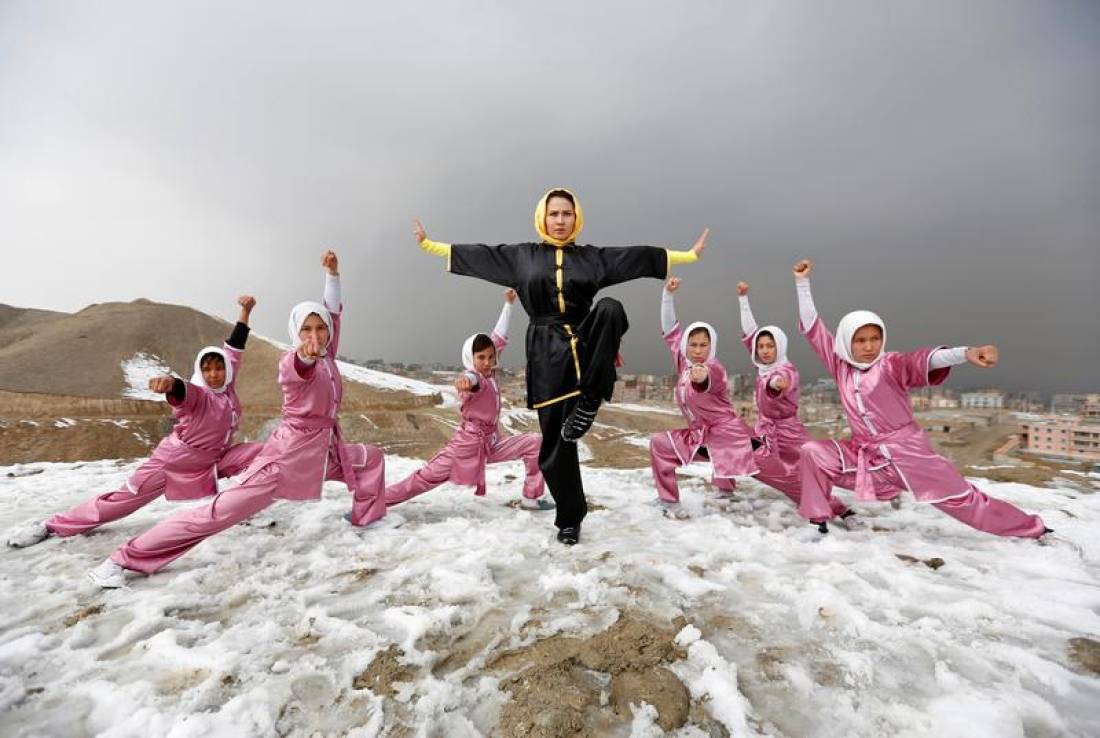WIDER IMAGE-Afghan girls fight prejudice with martial arts
news.trust.org - Girls of the Shaolin Wushu club face regular harassment and abuse in addition to the normal dangers of life in Kabul KABUL, Feb 3 (Reuters) - On a snowy mountaintop to the west of Kabul, a group of Afghan girls practise the flowing movements of Wushu, a sport developed from ancient Chinese kung fu martial arts, stretching and bending and slashing the air with bright swords.
In a country where women's sport is severely restricted, the Shaolin Wushu club in a part of Kabul that is home to the capital's Hazara ethnic community, is a rare exception.
Sima Azimi, the 20-year-old leading the practice session, says Wushu teaches self-defence, but just as important, "it's really effective for body and soul".
She learned the sport in Iran, where she won a gold and bronze medal in competition, and she has been teaching in Kabul for about a year, encouraged by her father, with whom she trains at the club's gym.
"I am working with Afghan girls to strengthen their abilities and I love to see Afghan girls improve the way other girls have improved in the world," she said.
Islamophobia Has Become So Bad That Some Muslim Girls Are Afraid to Wear Their Hijabs
No matter their religion or personal reasons, everyone deserves to feel comfortable to express themselves and dress how they wish. Unfortunately; bigotry, Islamophobia, sexism and a host of other biases keep many Muslim girls and young women from being able to be true to themselves. One writer explores the issue in an article from Teen Vogue last month: The struggle to fit in, how her identity is politicized in ways that others' identities and styles aren't, even outright hostility she and other Muslim women or girls face due to terrorist attacks that have nothing to do with them. Whether Muslim women shed their hijab or choose to embrace it, they deserve respect and understanding; just like everyone. That this even bears stating is disheartening.
It's time to focus on the women, not what they choose to wear.
Click through for the full article.
teenvogue.com - I remember when I started to feel uncomfortable with my body: I was 11 and suddenly became very aware that there was a “right” one and a “wrong” one. I wasn't sure where I fit in, and even though I was probably completely average or normal, I couldn't see that then through my preteen haze. This is common for many girls that age, but for me it was compounded because when I turned 12, I started to wear the hijab, and became even more uncomfortable in my own skin.
There were days that I was too anxious to leave home because the idea of people staring at me was too much to think about. I still have bad days, but for the most part my hijab is now intrinsic to my identity. For some Muslim women, however, the external impacts of wearing a veil become too much for their mental health. Amidst a growing climate of Islamophobia, many Muslim women who wear a headscarf are choosing to remove their veil. Even though many Muslim women, including myself, still wholeheartedly embrace and wear the hijab with joy and pride, others are voluntarily choosing to remove it due to external pressures. Debra Schubert, for example, who lives in Quebec, chose to stop wearing a hijab after feeling physically unsafe on multiple occasions. "One time when I was living in Montreal, a man followed me into my apartment and yelled at me that I was living in Canada and didn’t need to dress like this," says Debra. Her decision was as much for her mental health as it was out of fear that harm might come to her.
Read more here.




